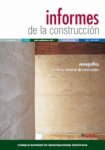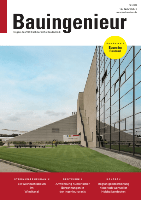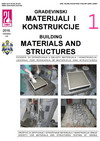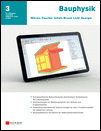
Nanotechnologies in Construction-A Scientific Internet-Journal
Scope & Guideline
Pioneering Research for a Stronger, Smarter Built Environment
Introduction
Aims and Scopes
- Nanomaterials in Construction:
Research on the incorporation of nanomaterials, such as carbon nanotubes and nanoparticles, to modify and enhance the properties of traditional construction materials like cement, concrete, and polymers. - Sustainable Construction Practices:
Exploration of sustainable methods and materials in construction, including the recycling of waste materials and the development of eco-friendly composites, which contribute to a circular economy. - Advanced Material Development:
Focus on the creation and optimization of new composite materials that offer improved performance, such as higher strength, durability, and thermal insulation, through the use of nanotechnology. - Characterization and Testing Methodologies:
Development of innovative testing methods and characterization techniques for assessing the properties and performance of nanostructured materials in construction. - Interdisciplinary Approaches:
Encouragement of interdisciplinary research that combines knowledge from materials science, engineering, and environmental studies to address complex challenges in construction.
Trending and Emerging
- Circular Economy and Waste Utilization:
An increasing number of studies focus on recycling waste materials into construction products, promoting a circular economy that reduces environmental impact and resource consumption. - Polymer and Composite Innovations:
There is a notable rise in research on polymer-based composites, particularly those enhanced with nanomaterials, which are being developed for their superior properties and applications in construction. - Nanotechnology for Enhanced Performance:
Emerging themes include the use of nanotechnology to improve the performance characteristics of construction materials, such as increasing strength, durability, and resistance to environmental factors. - Smart Construction Technologies:
The integration of smart technologies, including automation and monitoring systems that utilize nanotechnology, is gaining traction, reflecting a shift towards more intelligent construction methodologies. - Environmental and Health Safety of Nanomaterials:
There is a growing concern and focus on the environmental and health impacts of nanomaterials, leading to research aimed at ensuring safe application practices in construction.
Declining or Waning
- Traditional Construction Materials:
There has been a noticeable decline in research focused solely on traditional materials without the integration of nanotechnology, indicating a shift towards more innovative, nanomaterial-based alternatives. - Generalized Environmental Impact Studies:
Research that broadly addresses environmental impact without specific links to nanotechnology applications is becoming less prevalent, as the focus shifts to more targeted studies that evaluate nanomaterials' specific environmental benefits. - Basic Theoretical Studies:
The decline in purely theoretical studies in favor of applied research that demonstrates practical applications of nanotechnology in construction suggests a trend towards more hands-on, experimental approaches. - Non-nanotechnology Related Innovations:
Innovations that do not incorporate nanotechnology are decreasing, as the journal increasingly prioritizes research that explicitly integrates nanotechnology into construction practices.
Similar Journals

Advances in Concrete Construction
Innovating Concrete Practices for a Sustainable FutureAdvances in Concrete Construction, published by TECHNO-PRESS in South Korea, is a pivotal academic journal dedicated to the fields of Building and Construction, Civil and Structural Engineering, and Mechanics of Materials. Established with the aim of fostering innovative research, this journal has rapidly gained recognition, achieving a commendable Q2 ranking across multiple categories, including Safety, Risk, Reliability, and Quality as of 2023. Featuring a blend of rigorous peer-reviewed articles, the journal serves as a vital platform for scholars, engineers, and students alike to disseminate cutting-edge research and practical applications in concrete construction technologies. Despite its absence of Open Access, the journal's inclusion in Scopus with notable rankings - such as #66 in Building and Construction - underscores its growing influence and commitment to quality as it converges on significant advancements from 2016 to 2024. By contributing to this respected journal, you join a community dedicated to exploring the future of sustainable and efficient construction practices.

Informes de la Construccion
Elevating discourse in architecture and engineering since 1957.Informes de la Construccion, an esteemed journal published by CONSEJO SUPERIOR INVESTIGACIONES CIENTIFICAS-CSIC, serves as a vital platform for disseminating scholarly research in the fields of Architecture, Building and Construction, and Civil Engineering. With an impact factor that reflects its impact within the community, this open access journal has been promoting scientific discourse since 1957, making its comprehensive archive freely available to researchers, professionals, and students alike. The journal maintains a diverse scope, covering significant advancements in construction techniques, sustainable practices, and innovative designs that respond to contemporary challenges in built environments. Currently ranked in the Q2 category for Architecture and positioned within the top quartiles for multiple engineering disciplines, Informes de la Construccion is recognized for its contribution to the engineering scholarship landscape, offering insights that are crucial for overcoming the complexities in modern construction and environmental engineering. Based in Madrid, Spain, the journal encourages contributions that explore both theoretical and practical aspects of construction, fostering an inclusive community dedicated to the advancement of knowledge in this pivotal field.

Bauingenieur
Shaping the Future of Building and Construction EngineeringBauingenieur, an established journal in the field of Building and Construction and Civil and Structural Engineering, has been a significant platform for scholarly discourse since its inception in 1969. Published by VDI FACHMEDIEN GMBH & CO KG UNTERNEHMEN FACHINFORMATIONEN in Germany, this journal, available in both print (ISSN: 0005-6650) and electronic formats (E-ISSN: 1436-4867), serves as a vital resource for researchers, professionals, and students dedicated to advancing knowledge and practice in engineering. Although currently without open access options, Bauingenieur aspires to contribute to the academic community by presenting cutting-edge research, case studies, and technical reviews within the realms of construction and civil engineering. As evidenced by its categorizations in the 2023 Scopus rankings, where it has a Q4 designation in both relevant categories, it provides an essential resource for understanding current trends and challenges in the industry. The journal welcomes contributions that push the boundaries of knowledge and foster innovative solutions in the built environment.

Gradevnski Materijiali I Konstrukcije-Building Materials and Structures
Advancing construction knowledge for a sustainable future.Gradevnski Materijiali I Konstrukcije - Building Materials and Structures is a premier open-access journal dedicated to advancing the field of construction materials and structural engineering. Published by SOC MATERIALS & STRUCTURES TESTING SERBIA, this journal provides a platform for researchers, professionals, and students to share their innovative findings and developments in building materials. With a commitment to open-access since 2012, it fosters unrestricted availability of research for a wider audience, encouraging collaboration and knowledge dissemination. The journal features a diverse range of topics, including material testing, structural integrity, and sustainable construction practices, making it a vital resource for those engaged in the design and analysis of structural components. By fostering the advancement of research and practice in this crucial sector, Gradevnski Materijiali I Konstrukcije plays an essential role in shaping the future of construction and material science.

STEEL AND COMPOSITE STRUCTURES
Advancing the Future of Structural EngineeringSTEEL AND COMPOSITE STRUCTURES is a leading academic journal published by TECHNO-PRESS, dedicated to the fields of Building and Construction, Civil and Structural Engineering, and Materials Science. With a notable Impact Factor and classified in Q1 and Q2 quartiles in multiple relevant categories as of 2023, the journal provides a high-quality platform for the dissemination of innovative research from its converged publishing years of 2004 to 2024. The journal's rigorous peer-review process ensures that only the most impactful studies receive publication, fostering advancements in composite materials and steel structures. Researchers, professionals, and students alike can gain valuable insights into current technologies and applications in these critical fields, making STEEL AND COMPOSITE STRUCTURES an essential resource for anyone involved in structural engineering and materials research. The journal is based in South Korea, and while it offers traditional access options, the breadth of its contributions ensures a global reach and influence.

Cement Wapno Beton
Innovating Building Materials for TomorrowCement Wapno Beton is a renowned academic journal published by STOWARZYSZENIE PRODUCENTOW CEMENTU, focusing on the intricate fields of building and construction, as well as materials science. With the ISSN number 1425-8129, this publication has been committed to advancing knowledge and fostering innovation since its inception in 2007, and it will continue until 2024. The journal operates within a competitive landscape, as reflected in its 2023 Scopus rankings, placing it in the third quartile (Q3) in both Building and Construction and Materials Science categories. Although it currently does not offer open access options, Cement Wapno Beton remains an essential resource for researchers, professionals, and students seeking valuable insights into the latest developments and technologies in construction materials. Its scope encompasses a wide range of topics, including architectural advancements, sustainable building practices, and innovative material applications, making it an indispensable tool for those dedicated to the evolution of construction science.

Revista Ingenieria de Construccion
Innovating Building Practices for a Sustainable FutureRevista Ingenieria de Construccion is a prominent open-access journal dedicated to advancing knowledge and practice in the fields of building and construction engineering, as well as civil and structural engineering. Published by the Pontificia Universidad Católica de Chile, specifically the Department of Engineering and Construction Management, this journal has been providing free access to quality research outputs since 1986, ensuring that vital information is available to both practitioners and academics globally. With its current placement in the Q4 category of both the Building and Construction and Civil and Structural Engineering quartiles, it serves as a platform for innovative studies and critical discussions, positioning itself strategically within the academic landscape. The journal is indexed in Scopus, ranking #157 in Building and Construction and #291 in Civil and Structural Engineering, reflecting the growing impact and relevance of its contributions. Researchers, professionals, and students are encouraged to engage with the rigorous and diverse content published within its pages, fostering a vibrant academic and practical discourse.

R Journal
Fostering Excellence in Statistical MethodologiesR Journal, published by the R Foundation for Statistical Computing, is a premier academic journal dedicated to advancing the fields of numerical analysis and statistical methodologies. With an ISSN of 2073-4859, the journal has established itself as a significant platform for high-quality research since its inception in 2009. It operates under a Q2 category ranking in respective fields, including Statistics and Probability, among others, highlighting its influence and relevance in the academic community. Researchers are encouraged to contribute their findings, as the journal appeals broadly to statisticians, mathematicians, and data scientists alike. Although not an open-access journal, its commitment to rigorous peer review ensures that published works maintain high standards of scientific integrity. The R Journal's vision is to foster innovative approaches within statistical computing, making it an invaluable resource for those seeking to deepen their understanding or stay abreast of developments in the discipline.

Bauphysik
Transforming Research into Architectural ExcellenceBauphysik, published by ERNST & SOHN, is a prestigious journal dedicated to the fields of architecture, building construction, and environmental engineering. With a strong focus on the principles of building physics, Bauphysik serves as a key platform for researchers, professionals, and students alike, disseminating vital information and advancements within the industry. The journal, boasting an ISSN of 0171-5445 and an E-ISSN of 1437-0980, is well-regarded with a categorization in the Q2 quartile in Architecture and Q4 quartiles in Building and Construction and Environmental Engineering as of 2023. Its Scopus ranks further highlight its impact within the community, with rankings of 83/189 in Architecture, 179/223 in Building and Construction, and 167/197 in Environmental Engineering. Despite its lack of open access options, the journal's retrospective convergence from 1982 to 2024 marks its long-standing influence in advancing building physics research. With a dedicated readership, Bauphysik encourages the exploration and sharing of innovative solutions to contemporary challenges in the built environment.

Journal of Materials and Engineering Structures
Innovating the Future of Materials ScienceJournal of Materials and Engineering Structures is a pioneering Open Access journal published by MOULOUD MAMMERI UNIVERSITY OF TIZI-OUZOU, dedicated to advancing the field of materials science and engineering. Since its inception in 2014, the journal has aimed to provide researchers, professionals, and students with a platform for sharing cutting-edge research and innovative applications in materials engineering and construction structures. Although the HIndex and Scopus ranking data are not specified, the journal plays a crucial role in disseminating knowledge that contributes to the development of sustainable and efficient engineering practices. With its commitment to accessibility and knowledge sharing in the heart of Algeria, the Journal of Materials and Engineering Structures is poised to make a significant impact on both local and global academic communities.